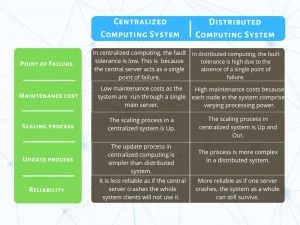Centralized computing systems and distributed computing systems both are essential services of the networking services. Before the networks appear in the computing system, companies build big data centers to perform different batches of work in a centralized strategy. Administrators manually prepare machines and other things to perform a set of work in such cases. As the internet and networks become a picture, businesses expand their computational services for clients and users. The client-server model is the best option for building a centralized computing system in today’s modern era.
In a distributed computing system, independent computers are connected to a single system, which appears to the users. It consists of multiple systems that communicate via a shared network. Here in this article, we will study the difference between centralized and distributed computing systems with their advantages and disadvantages.
- What Is a Centralized Computing System?
- Characteristics of Centralized Computing System
- Advantages of Centralized Computing System
- Disadvantages of centralized system
- Distributed Computing System
- Advantages of Distributed Computing System
- Disadvantages of Distributed Computing System
- Difference between Centralized Computing System & Distributed Computing System
Centralized computing is used to perform the computing services on a central server. The computing architecture uses a central server to connect single or multiple personal computers (PCs) of users or clients. A centralized computing system allows and implements all the resources and administration parameters linked to the central server. After that, the central server can deliver the application logic and provide computing services to the client’s machine.
According to Wikipedia, “Centralized computing is done at a central location, using terminals attached to a central computer. The computer itself may control all the peripherals directly (if they are physically connected to the central computer) or be attached via a terminal server. Alternatively, if the terminals have the capability, they may be able to connect to the central computer over the network. The terminals may be text terminals or thin clients”.
Usually, the client uses thin PCs which has limited capacity. It has a typical visual display, I/O devices, and a narrow central processing unit with some networking abilities. Hence, the central server uses to connect the client’s PCs over the network to use the computing services. The client can get multiple computing features with a central server like computing resources and storage facilities. Client nodes depend entirely on the main server to perform any computing activity or work related to computing.
A centralized computing system has some essential characteristics:
Global clock
- In a centralized computing system, all the client’s nodes are connected to a typical or central node. We can say that the whole system is connected to the main server. Hence, all these connect to the global clock at the central server or sync up with it.
Single Central Unit
- A single central unit is nothing but the Central Server that coordinates with other nodes.
Dependent failure of components
- If the primary or central server fails, the entire system is down.
A centralized system uses client-server architecture having the central node or server. All the other nodes connected to the system are the client’s nodes. The client-server architecture helps businesses to manage their work from a single server.
Following are the advantages of the centralized computing system.
- The main advantage of a centralized computing system is that it differentiates between the server and clients. It is an easy way to secure the server & the client nodes as per their locations.
- Another advantage of a centralized system is it provides a smooth and easy working experience. For instance, the client has a particular system, and the company uses the same system to modify some custom needs.
- It provides dedicated resources like storage, CPU core, etc.
- The centralized system is more economical than distributed system and small systems can use it up to a specific limit. A centralized system requires a small fund to set up. Hence businesses with a small system infrastructure can use a centralized computing system.
- A centralized system makes a quick update of the client machine possible. It is only possible with one device.
- It provides easy separation of nodes from the system. It helps to remove the central server connection with the client’s nodes.
The centralized computing system has some disadvantages also. Here are some disadvantages of this system:
- The centralized computing system is highly dependent on the connectivity of the network. Therefore, if the network connection gets loose, the system may fail as both are connected to the same central server.
- With a centralized computing system, immediate failure of the entire system may occur, as there is no graceful mortification of the system.
- In this computing system, if the central server node fails, there is no way to back up your data. Hence, you can directly lose the data.
- With a centralized computing system, server maintenance is quite tricky. As we know, it has only one central server node, and if we wanted to shut it down for server maintenance, it was unprofessional and inefficient.
The distributed computing system is nothing but a system with multiple elements providing the service. The components in distributed computing are interconnected and help give the client’s required information. A distributed computing system makes data exchange accessible and available to the client. Moreover, it happens with the help of regular communication through networks.
In distributed computing, every entity or component attached to the system makes its own decisions. However, sometimes these components or entities make the decisions by coordinating with each other, then the system is distributed computing.
According to IBM, “A distributed computer system consists of multiple software components on multiple computers, but run as a single system. The computers in a distributed system can be physically close together and connected by a local network, or geographically distant and connected by a wide area network. A distributed system can consist of various possible configurations, such as mainframes, personal computers, workstations, minicomputers, etc. Therefore, they are distributing computing aims to make such a network work as a single computer”.
Various distributed computing systems exist, like the World Wide Web (WWW). WWW itself acts as a distributed system. The peer-to-peer architecture of the distributed system helps to explore the features of this system.
Even if the distributed computing system provides an architecture for many aspects, it has many provocations. For an instant, coordination between the distributed entities. Another challenge is the agreement of the entities in the distributed computing system. Due to such challenges, a distributed system is not a preferable option in many areas; hence, it has become a specific area in computing.
The distributed system has some advantages in computer science.
- With distributed computing system, there are minimal chances of stoppage situations. The entire load is divided into all the components of the system. It will balance the load and there are no chances of bottleneck situations.
- In a distributed system, nodes such as servers, CPUs, and PCs are available. These nodes are always available for clients.
- Above all, the controlling power of the resources in a distributed system is high. All the nodes can control their behavior. This helps to balance the load.
- Firstly, with a distributed computing system, global tasks are challenging to achieve. There is no proper chain of commands to perform such tasks.
- Secondly, if any node fails for some reason, it will be tough to find that particular node.
- Thirdly, the management of the distributed system is quite tricky. As the number of entities connected, it is difficult to track & monitor every node.
- Lastly, the capacity of each node is different; hence, it is another big challenge for the administration.
Above we studied in detail information about centralized and distributed computing systems with their advantages and disadvantages. The centralized computing system is more popular and convenient than distributed computing.
However, we identified some common differences between centralized computing systems and distributed computing systems.
Conclusion
In conclusion, we studied the difference between centralized and distributed computing systems. Businesses can differentiate between the server and clients with a centralized computing system. In distributed computing, every entity or component attached to the system makes its own decisions; hence the system is said to be decentralized.
Also Read:
5 Best Practices for Cloud Data Integration
What is the purpose of cloud rapid elasticity in Cloud Computing?


